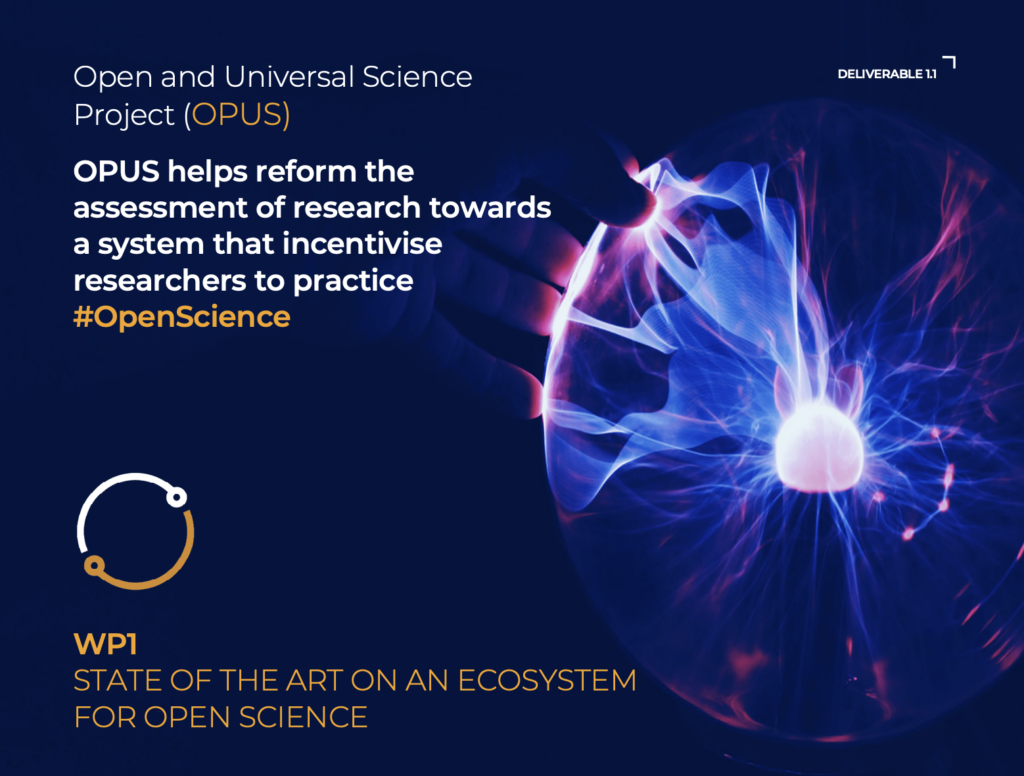
Open Science Literature Review
Open Science Literature Review https://opusproject.eu/wp-content/uploads/2023/03/Screenshot-2023-03-10-at-13.00.13-1024x776.png 1024 776 Open and Universal Science (OPUS) Project Open and Universal Science (OPUS) Project https://opusproject.eu/wp-content/uploads/2023/03/Screenshot-2023-03-10-at-13.00.13-1024x776.pngThe team behind the OPUS project examined literature on Open Science. This has been conducted (and will later be updated) as part of state-of-the-art on literature to reform research(er) assessment and incentivize and reward Open Science, to stay up-to-date on research assessment reform and encourage Open Science practices.
Open Science (OS) has emerged as an inclusive movement that aims to make scientific knowledge multilingual, openly available, accessible, and reusable for everyone. The movement also seeks to increase scientific collaborations and sharing of information, and to open the processes of scientific knowledge creation, evaluation, and communication to societal actors beyond the traditional scientific community. To achieve these goals, the research community needs to reform the researcher assessment system and incentivize and reward OS practices. The OPUS project was initiated to address this need, and it has three main components: incentives for OS, metrics and indicators for OS, and pilots to implement and monitor OS.
The first component, incentives for OS, involves a review of the existing literature on researcher assessment and the incentivization of OS practices. The review found that the current assessment system focuses too much on bibliometrics, which involves peer-reviewed publications and citations in top journals. To promote OS, the research community needs a more comprehensive approach that includes research/non-research, open/closed, and quantitative/qualitative dimensions. The literature also suggests several proposals for frameworks, including principles, guidelines, support, and indicators/metrics to reform researcher assessment.
The second component, metrics and indicators for OS, involves the identification of key metrics and indicators that can measure the impact of OS practices. This component is crucial for incentivizing and rewarding OS, as it enables the research community to measure the impact of OS practices and their contribution to the scientific community and society. The OPUS project is currently developing a framework of indicators/metrics for researcher assessment, including OS, to promote the adoption of OS practices in research-performing and research-funding organizations.
The third component, pilots to implement and monitor OS, involves the implementation of the framework developed in the second component in research-performing and research-funding organizations. The pilots will test the effectiveness of the framework and identify any areas that require improvement. The ultimate goal of the pilots is to promote the adoption of OS practices and reform the researcher assessment system to incentivize and reward OS practices.
In conclusion, the OPUS project is a vital initiative that seeks to promote OS practices, reform the researcher assessment system, and incentivize and reward OS practices. The project’s three components, incentives for OS, metrics and indicators for OS, and pilots to implement and monitor OS, provide a comprehensive approach to promoting OS and ensuring its adoption in the research community. Ultimately, the adoption of OS practices will enable the research community to increase scientific collaborations, sharing of information, and open engagement of societal actors, leading to greater trust in science by researchers and the public.
- Posted In:
- OPUS News




